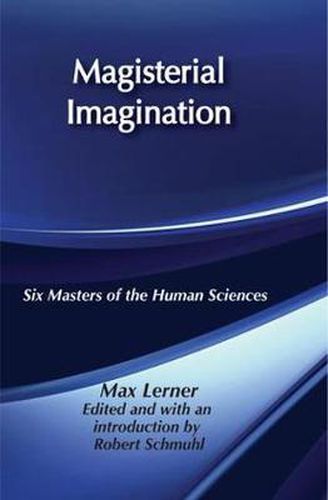Readings Newsletter
Become a Readings Member to make your shopping experience even easier.
Sign in or sign up for free!
You’re not far away from qualifying for FREE standard shipping within Australia
You’ve qualified for FREE standard shipping within Australia
The cart is loading…






This work brings together Max Lemer’s extended and enduring essays on Aristotle, Niccolb Machiavelli, Alexis de Tocqueville, John Stuart Mill, Thorstein Veblen, and Oliver Wendell Holmes, Jr. Combining biography and interpretation, Lerner insightfully examines a cluster of thinkers who helped shape his own influential work in political theory and civilizational analysis. Viewed collectively, these essays show Turner’s method and mind at their best.
Like Lerner himself, the masters were tough-minded realists-philosophers who saw human experience in all of its variety as central to study. Less inclined to metaphysical speculation, they wrestled with the real concerns and circumstances of therr times-but always within the larger context of ultimate meaning and consequence. Lerner eloquently introduces each philosopher and his work, but he also provides his own criticism and commentary. Complicated subjects are clearly presented, and cross-disciplinary analysis enhances the reader’s sense of the whole.
In his introduction, Robert Schmuhl discusses why Lerner was attracted to these particular thinkers and how they refined his approach to the human sciences. Schmuhl also traces the influence of these figures on Lemer’s work. Magisterial Imagination will be of importance to philosophers, political theorists, and sociologists.
$9.00 standard shipping within Australia
FREE standard shipping within Australia for orders over $100.00
Express & International shipping calculated at checkout
This work brings together Max Lemer’s extended and enduring essays on Aristotle, Niccolb Machiavelli, Alexis de Tocqueville, John Stuart Mill, Thorstein Veblen, and Oliver Wendell Holmes, Jr. Combining biography and interpretation, Lerner insightfully examines a cluster of thinkers who helped shape his own influential work in political theory and civilizational analysis. Viewed collectively, these essays show Turner’s method and mind at their best.
Like Lerner himself, the masters were tough-minded realists-philosophers who saw human experience in all of its variety as central to study. Less inclined to metaphysical speculation, they wrestled with the real concerns and circumstances of therr times-but always within the larger context of ultimate meaning and consequence. Lerner eloquently introduces each philosopher and his work, but he also provides his own criticism and commentary. Complicated subjects are clearly presented, and cross-disciplinary analysis enhances the reader’s sense of the whole.
In his introduction, Robert Schmuhl discusses why Lerner was attracted to these particular thinkers and how they refined his approach to the human sciences. Schmuhl also traces the influence of these figures on Lemer’s work. Magisterial Imagination will be of importance to philosophers, political theorists, and sociologists.